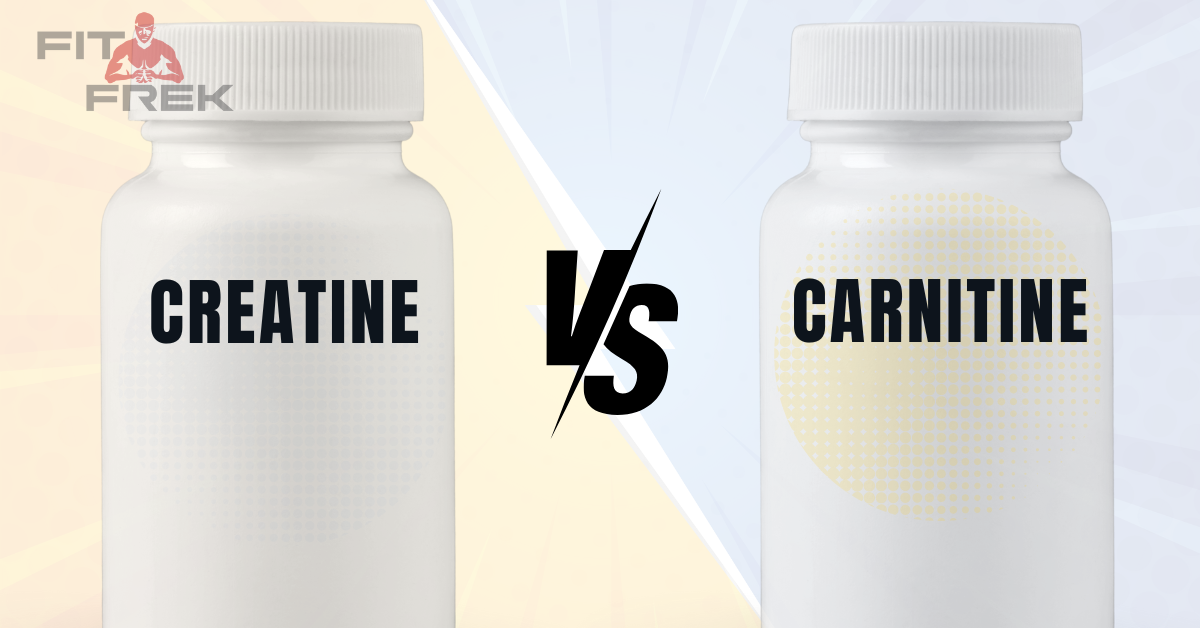
Supplements enhance performance, recovery, and results.
Two such popular supplements are Creatine and L-Carnitine.
Both are naturally occurring substances in the body and have unique benefits regarding exercise performance.
But what's the difference between the two, and which one should you choose?
Let's dive in and find out.
Creatine is a substance naturally found in muscle cells.
It helps your muscles produce energy during heavy lifting or high-intensity exercise.
On the other hand, L-Carnitine is an amino acid that benefits energy production by transporting fatty acids into your cells' mitochondria.
The mitochondria act as engines within your cells, burning these fats to create usable energy.

Creatine is synthesized in the body from the amino acids glycine, arginine, and methionine.
It's also found in foods like red meat and seafood.
However, the amount from diet alone may not be enough to optimally enhance athletic performance, which is why many athletes and bodybuilders turn to creatine supplements.
Creatine primarily increases the body's store of Creatine Phosphate (CP), which produces Adenosine Triphosphate (ATP) during high-intensity exercise.
ATP is the primary source of energy for muscle contractions.
By increasing ATP production, creatine supplementation can improve strength, power, and high-intensity exercise performance.
L-Carnitine is synthesized in the body from the amino acids lysine and methionine.
It's also found in meat, fish, poultry, and dairy products. L-Carnitine plays a crucial role in fat metabolism by transporting long-chain fatty acids into the mitochondria to be oxidized for energy.
In addition to its role in fat metabolism, L-Carnitine has been shown to improve exercise recovery, increase oxygen supply to muscles, increase blood flow and nitric oxide production, helping reduce muscle soreness and damage.
Creatine, a substance naturally produced by our bodies and found in foods like red meat and seafood, is a popular supplement among athletes and fitness enthusiasts.
It's well-known for its ability to enhance strength, increase lean muscle mass, and help muscles recover more quickly during exercise.
One of the key benefits of creatine is its ability to increase high-intensity exercise capacity.
This means it can help you perform better during high-intensity workouts, allowing you to lift heavier weights or perform more repetitions.
This is because creatine increases the phosphocreatine stores in your muscles, which then helps produce more ATP, a high-energy molecule needed for heavy lifting and high-intensity exercise.
Creatine also aids in muscle recovery.
Research shows that creatine supplementation can help reduce muscle inflammation and soreness after exercise, making it a valuable supplement for recovery.
Moreover, creatine has been shown to increase lean body mass when combined with resistance training.
This is likely due to increased water content of muscles, making them larger, and the ability of creatine to stimulate muscle protein synthesis.
On the other hand, L-Carnitine is a naturally occurring amino acid derivative often taken as a weight loss supplement.
It plays a crucial role in energy production by transporting fatty acids into your cells' mitochondria, which can then be burned for energy.
This is particularly beneficial during endurance exercises, where fat oxidation produces a significant portion of energy.
One of the main benefits of L-Carnitine is its ability to enhance fat burning.
Research shows that L-Carnitine supplementation can increase fat oxidation during low-intensity exercise, benefit weight management and endurance performance.
L-Carnitine also has an impact on exercise recovery.
Studies have shown that supplementation with L-Carnitine can reduce muscle damage and markers of metabolic stress from high-intensity exercise.
This can lead to a reduction in muscle soreness and improved recovery time.
Furthermore, L-Carnitine has been linked to improvements in cognitive function.
It has been shown to have neuroprotective benefits that can help improve memory and reduce mental fatigue.
When it comes to the comparison between creatine and L-Carnitine, it's clear that both supplements offer unique benefits.
Creatine is more geared towards those looking to improve strength and performance in high-intensity workouts, and those looking to increase muscle mass.
It's also beneficial for enhancing recovery after these types of workouts.
On the other hand, L-Carnitine is more suited for those looking to enhance fat burning and improve endurance performance.
It also benefits recovery after high-intensity exercise and offers additional cognitive benefits.
In terms of research, both supplements are well-studied and have a strong evidence base supporting their benefits.
However, the effects of creatine on strength and performance are more pronounced and consistent across studies compared to the effects of L-Carnitine on fat burning and endurance performance.
When it comes to fat loss, while L-Carnitine has been shown to enhance fat burning, it's important to note that this does not necessarily translate to a significant reduction in body weight or body fat percentage without a calorie-restricted diet.
In terms of overall benefits, it depends on your individual goals.
If your main goal is to increase strength and muscle mass, then creatine may be the better choice.
If you want to enhance fat burning, improve endurance performance, and get additional cognitive benefits, then L-Carnitine may be more suitable.
Creatine and L-Carnitine are popular supplements among athletes and bodybuilders for their unique benefits.
Creatine is primarily used for improving strength and high-intensity exercise performance.
It increases the body's store of Creatine Phosphate, which is used to produce the energy molecule ATP during high-intensity exercise.
On the other hand, L-Carnitine is often used by those looking to lose weight or improve endurance performance.
It works by transporting fatty acids into the mitochondria where they can be burned for energy.
Similarities:
Differences:

L-Carnitine has been associated with several health benefits, particularly in cardiovascular health and lipid metabolism.
Here are some key findings from scientific studies:
Creatine is a popular supplement among athletes and fitness enthusiasts for its wide range of benefits related to workouts, performance, and overall health.
Here's a simplified breakdown of its benefits:
Remember, while creatine is safe for most people, it's always a good idea to talk to your doctor or a dietitian before starting any new supplement regimen.
Numerous studies have shown the benefits of both creatine and L-Carnitine supplementation.
For creatine, a study found that creatine supplementation and resistance training increased muscle strength and weightlifting performance.
Another meta-analysis found that creatine supplementation improved body composition and performance in resistance training individuals.
For L-Carnitine, a study found that L-Carnitine supplementation favorably affected markers of exercise stress and recovery.
Another study found that L-Carnitine improved glucose disposal in type 2 diabetic patients, suggesting a potential role in weight management.
The main difference between creatine and L-Carnitine is their primary functions and uses.
Creatine is primarily used for improving strength and power output during high-intensity exercise, while L-Carnitine is often used for weight loss and improving endurance performance.
Both creatine and L-Carnitine have been extensively researched over the years.
However, the benefits of creatine in improving strength and high-intensity exercise performance are more consistently supported by research than L-Carnitine's weight loss and endurance benefits.
When improving strength and high-intensity exercise performance, creatine is the clear winner.
By increasing the body's store of Creatine Phosphate, creatine supplementation can improve strength, power, and high-intensity exercise performance.
While both supplements can potentially aid in fat loss, L-Carnitine's role in fat metabolism makes it a popular choice among those aiming for weight loss.
However, it's worth noting that the effects of L-Carnitine on weight loss are less consistent and may vary among individuals.
The answer to this question largely depends on your individual fitness goals.
If your primary goal is to improve strength and power output during high-intensity exercise, creatine may be the better choice.
However, L-Carnitine could be more beneficial if you aim for weight loss or improved endurance performance.

Q: Can I take both creatine and L-Carnitine together?
Yes, both supplements can be taken together and may offer complementary benefits. However, it's always best to consult a healthcare professional before starting any new supplement regimen.
Q: Are there any side effects of taking creatine or L-Carnitine?
Both supplements are generally well-tolerated, but as with any supplement, they can cause side effects in some people. Common side effects of creatine include stomach discomfort, nausea, and muscle cramps. L-Carnitine can cause side effects like nausea, vomiting, stomach upset, and diarrhea. It's always best to start with a lower dose to assess your tolerance.
Q: How should I take creatine or L-Carnitine for best results?
For creatine, doing a "loading phase" of 20 grams per day for 5-7 days is often recommended, followed by a "maintenance phase" of 3-5 grams per day. For L-Carnitine, a common dose is 500-2,000 mg per day.
Q: Do I need to cycle creatine or L-Carnitine?
There's no need to cycle creatine or L-Carnitine. Both can be taken continuously without any adverse effects.
Q: Can vegetarians or vegans take creatine or L-Carnitine?
Yes, both supplements can be taken by vegetarians and vegans. However, as both creatine and L-Carnitine are found in animal products, vegetarians and vegans may have lower levels of these compounds and may benefit more from supplementation.
Creatine and L-Carnitine are both powerful supplements that offer unique benefits.
Creatine is great for improving strength and performance in high-intensity workouts and increasing muscle mass.
L-Carnitine benefits those looking to enhance fat burning, improve endurance performance, and get additional cognitive benefits.
Your choice between the two will largely depend on your individual fitness goals and needs.
Useful Links
 About FitFrek
About FitFrekFitFrek operates as an independent platform, offering comprehensive workouts, programs, routines, guides, and unbiased reviews to accelerate your progress. We pride ourselves on our honesty, delivering straightforward and candid insights. FitFrek does not offer medical advice, diagnosis, or treatment services.